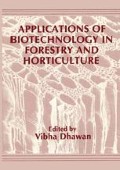Abstract
World-wide activity in forestry shows forest genetics to be the most effective component in tree plantation programs because it produces genetically improved trees that show better growth, tree form, site adaptability, wood quality, crop security and product uniformity. In tree improvement, genetic and silvicultural techniques arc combined at both the nursery-and planting-site-levels (e.g., genotype/site-reactions). The intra-specific genetic variation found within the distributional range of wild tree species forms the basis for selection. This includes provenance, race and plus-tree selection and their site performance evaluations, followed by progeny tests and advanced-generation selective breeding and hybridisation. Genetic control is exercised through seed (sexual) and vegetative propagules (asexual reproduction). Improved germplasm thus produced is multiplied by the tree-breeder through clonal banks, seed zones, seed production areas and seed orchards. Outstanding genotypes are cloned true-to-parent only on a small-scale and mostly to aid breeding through methods of vegetative propagation. Genetically improved plants for plantations are, however, required in large numbers. They can be cloned on a large-scale by developing a tissue culture technique that can produce a large number of genetically stable and uniform trees identical to the elite parent. The situation regarding tree-improvement and mass-cloning research in Indian forestry is discussed with particular reference to the tissue culture technique.
Access this chapter
Tax calculation will be finalised at checkout
Purchases are for personal use only
Preview
Unable to display preview. Download preview PDF.
References
Ali, S.I. and Quaiser, M., 1980, Hybridisation in Acacia nilotica ( Mimosoideac ), Bot. J. Linn. Soc., 80: 69–77.
Bor, N.L., 1939, Summary of results to date of All-India Cooperative Seed Origin Investigation. In: Proc. 5-Silvicult. Conf. Paper ll, Item IV, Dehra Dun.
Brandis, D., 1906, Indian trees, pp. 7–24, Bishen Singh Mahendra Pal Singh, Dehra Dun.
Champion, H.G. and Seth, S.K., 1986, A revised swrev offorest types of India, pp. 6–18, Govt. of India, Delhi.
Chaturvedi, A.N., 1982, Poplar farming in U.P., U.P. Forest Bull., ( Lucknow ), 45: 1–42.
Dogra, P.D., 1972, Intrinsic qualities growth and adaptation potential of Pinus wallichiana. In: Biology of Rust Resistance in Forest Trees (R.T. Bingham, T.S. Hoff and G.I. McDonald, eds.), pp. 163–178, USDA Forest Service, Misc. Publ., No. 1121: Washington D.C.
Dogra, P.D., 1981a, Forest genetics research and application in Indian forestry-I, II, Indian For., 107: 191–219, 263–288.
Dogra, P.D., 1981b, Variability in biology of flowering in blue pine provenances of north-western Himalayas in relation to reproductive barriers and gene flow. In: Proc. Symp. Flowering Physiology IUFRO, W.P. Reprod. Processes 17th IUFRO World Cong. ( L. Krugman and M. Katsuta, eds.), pp. 8–16, Japan Forest Tree Breeding Assoc., Tokyo.
Dogra, P.D., 1981c, Natural variability and improvement potential of Indian trees. In: Woodpower: New Perspectives on Forest Usage ( J.J. Talbot and W. Swanson, eds.), pp. 59–80, Pergamon Press, New York.
Dogra, P.D., 1985, Conifers of India and their wild gene resources in relation to tree breeding, Indian For., 111: 935–955.
Dogra, P.D., 1986, Species diversity and gene conservation in Indian tree species in relation to forestry, Indian For. 112: 596–607.
Keiding, H. and Knudsen, F., 1974, Germination of teak in relation to international provenance testing, Forest Tree Improvement, Arboretet Horsholm, Copenhagen, 7: 19–29.
Keiding, H., Wellendorf, H. and Lauridsen, E.B., 1986, Evaluation of an International Series of Teak Provenance Trials, pp. 1–81, Putt’. DANIDA Forest Seed Centre, Humlebaek, Arboretum Horsholm.
Khoshoo, T.N. and Singh, N., 1963, Cytology of north-western Indian trees Zilphus jujuba and Z. rotundifolia, Silvae Genet., 12: 158–174.
Lohani, D.N., 1980, Teak seed origin trials in U.P., U.P. Forest Dept. R & D Circle, Lucknow, For. Leaflet.
Mehra, P.N., 1976, Cytology of Himalayan Hardwoods, Saraswaty Press, Calcutta.
Seth, S.K. and Khan, M.A.W., 1958, Regeneration of teak, Indian For., 84: 455–465.
Troup, R.S., 1921, The Silviculture of Indian Trees, Vol. 1–3, pp. 1170, Clarendon Press, Oxford.
Author information
Authors and Affiliations
Editor information
Editors and Affiliations
Rights and permissions
Copyright information
© 1989 Plenum Press, New York
About this chapter
Cite this chapter
Dogra, P.D. (1989). Forest Tree Breeding and Mass Cloning for Tree Improvement in Indian Forestry. In: Dhawan, V. (eds) Applications of Biotechnology in Forestry and Horticulture. Springer, Boston, MA. https://doi.org/10.1007/978-1-4684-1321-2_4
Download citation
DOI: https://doi.org/10.1007/978-1-4684-1321-2_4
Publisher Name: Springer, Boston, MA
Print ISBN: 978-1-4684-1323-6
Online ISBN: 978-1-4684-1321-2
eBook Packages: Springer Book Archive

